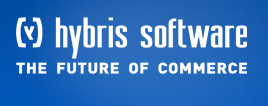As consumers and businesses continue to move to a multi-screen world where they expect services like payments, and their e-commerce back-end systems, to work the same wherever they are, e-commerce companies that are rising to the challenge are seeing just rewards. In the latest development, today Hybris Software, a specialist in multi-channel commerce solutions, announced that it has raised a $30 million round of investment to grow its business. The backing comes from new investors Meritech Capital Partners — storied backer of Facebook, Box, Yammer, Evernote and many more — and Greylock Israel, which were joined by Huntsman Gay Global Capital (HGGC), hybris’ biggest backer to date.
Hybris says that it will use the funding to expand its business in North America and Europe, including creating services for more verticals — it already has a strong business serving some 500 companies in the B2B and consumer brand space, with customers including General Electric, Thomson Reuters and 3M in B2B; and Toys“R”Us, P&G, Levi’s and Nikon in consumer. Specifically, there is more opportunity in Asia-Pacific, which only makes up about 15% of hybris’ business today compared to 85% for North America and Europe.
Similarly, Carsten Thoma, president at hybris, notes that the opportunity right now in terms of verticals is in the B2B market:
“Today, about 60% of hybris’ customers are using the solutions for business-to-consumer businesses, and about 40% are using them for business-to-business models,” he says. “While both areas are growing, business to business is growing faster from a revenue standpoint.” The company’s main competitors today, he says, are IBM and Oracle on a wider scale, but it also has specific competitors in different niches, such as Demandware in fashion.
Hybris claims that it is the “only” e-commerce solution on the market at the moment that provides an all-in-one offering to businesses, covering web and mobile, B2C and B2B, cloud and on-premises, order management and merchandising, and so on.
And when you look at the range of services that hybris offers, it puts Google’s reported interest in moving into the delivery game with an Amazon Prime competitor — closing its own e-commerce loop — into some perspective.
That’s because one key to the game right now seems to be in controlling all the different moving pieces. In hybris’ world, that includes mobile-based commerce on smartphones and tablets via browser and apps powered by the hybris platform; customer contact centers; in-store mobile point-of-sale (POS); and in-store pick up of web orders or to order from the online warehouse while in a store.
That promise of omniscience — or “omnicommerce” in the words of George Bischof of Meritech — is part of what attracted this round of investment, the first that appears to have been publicly disclosed in the company.
“Hybris is an exciting investment,” said Bischof in a statement. “Its OmniCommerce strategy is an opportunity for mid-sized businesses or large enterprises across the globe to make hybris as significant to customer-facing processes as ERP systems have become to back-end processes.” Bischof, who is an MD at Meritech, is also joining the hybris board of directors.
Given hybris’ role across the spectrum of e-commerce and payments, I asked about how some of the more emerging areas of payments are performing today, from where they are standing. Thoma notes that mobile commerce through hybris’ systems “averages about 10-15% of the total eCommerce business done, but this varies quite a bit across the wide-range of retail, B2B, media, software, and telco businesses hybris supports globally.” He also notes that while about 85% of hybris users are using the software in their own systems, the cloud-based solutions — which are run with third-parties like AT&T, Savvis, Rackspace, or hybris itself — are growing with the increasing interest in SaaS for e-commerce overall.
